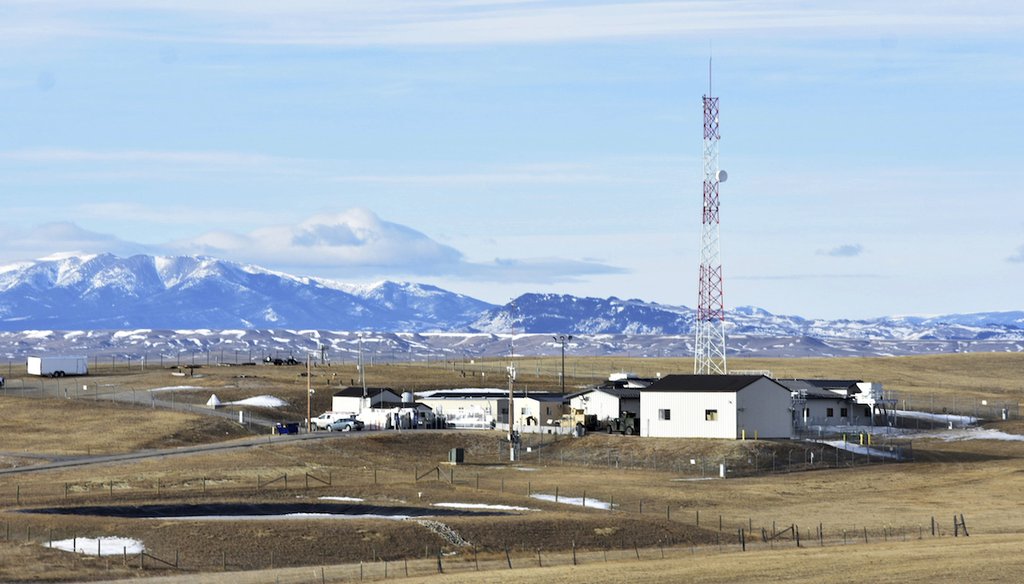Get PolitiFact in your inbox.

A U.S. Air Force installation surrounded by farmland in central Montana is seen Feb. 7, 2023. The Missouri House voted to ban entities from China and four other countries from purchasing land in the state. (AP/Matthew Brown)
If Your Time is short
-
Chinese investors, entities and U.S. corporations with Chinese shareholders collectively owned 383,935 acres of agricultural and non-agricultural land in the United States, as of 2021.
-
It is unclear how many of these acres are controlled by the Chinese Communist Party.
-
An expert said that although the Chinese Communist Party could influence or coerce Chinese individuals or entities to use farmlands for spying or other purposes, there hasn’t been good evidence of such activity.
Chinese investors’ ramped-up purchases of U.S. land in the past decade are drawing concerns among U.S. politicians who say this poses a national security threat.
Republican Florida Gov. Ron DeSantis in his March 7 State of the State address said the Chinese Communist Party "represents the greatest economic strategic and security threat that our country faces."
"Now we see the CCP trying to make strategic land purchases across the U.S., and our message in Florida is very simple. We will not allow land grabs by (CCP) packed businesses in our state," DeSantis said.
On March 2, during the Conservative Political Action Conference, Sen. Marsha Blackburn, R-Tenn., said there were "350,000 acres of U.S. farmland under control of the Chinese Communist Party today."
Some state lawmakers are proposing laws to ban Chinese citizens — among citizens from other countries — from buying land, homes and other property, in an effort to shield the U.S. from spying, theft and risks to food supply, USA Today reported in February.
Is the Chinese government controlling land in the United States? Here’s what we know.
U.S. land ownership
U.S. Department of Agriculture data shows that Chinese investors and entities, as well as U.S. corporations with Chinese shareholders, held 383,935 acres of agricultural and nonagricultural land in the United States as of Dec. 31, 2021.
The vast majority falls under the "agricultural" category, and a subset of that — 317,582 acres — is classified as "other agriculture," which includes swamps and marshes. "Other agriculture" excludes cropland, pasture and forest land.
U.S. corporations with Chinese shareholders own about half of the total acres attributed by the USDA to "China."
Overall, foreign individuals and entities own about 40 million acres of U.S. agricultural land.
USDA data shows that Canadian investors own the largest amount of U.S. agricultural and non-agricultural land: 12.8 million acres.
Chinese investors and entities plus U.S. corporations with Chinese stakeholders ranked 16th in the amount of U.S. land held by foreign countries as of Dec. 31, 2021, according to a Wall Street Journal analysis.
Is the Chinese Communist Party involved in these land purchases?
This is hard to tell with certainty.
The USDA told PolitiFact it has no information confirming any connections between the Chinese investors and the Chinese government.
Xiaobo Lü, a University of Texas at Austin associate professor, told PolitiFact it is a wrong assumption that these purchases are all connected to the Chinese Communist Party. Many of these purchases are made by individuals for personal or business objectives, he said.
Still, some Chinese entities that are not state-owned enterprises may have ties to the Chinese government. For example, in November 2021, a Chinese company called Fufeng Group bought a plot of land in North Dakota as a site for a manufacturing facility, a proposed project that the U.S. Air Force viewed as a "significant threat to national security." (Local officials voted to block the company from building the facility.)
The company is not a state-owned enterprise, but its chairman previously participated in a provincial People’s Congress —the provincial legislature of the People’s Republic of China — according to the U.S.-China Economic and Security Review.
Do these land purchases pose a security threat?
Chinese citizens and organizations are beholden to China’s 2017 National Intelligence Law, which allows the Chinese Communist Party to order citizens or companies to assist in intelligence work.
Lü also said that the Chinese Communist Party could influence or coerce Chinese individuals or entities to turn farmlands into a facility for spying or other purposes, but said he hasn’t seen good evidence showing this connection.
"Even if we find an instance or two in which a land purchase was connected with CCP operation, then the correct policy response should target the specific case instead of a blanket assumption targeting the entire population," he said.
A May 2022 report by the U.S.-China Economic and Security Review Commission, an independent congressional commission, said it is not clear why Chinese investors hold so much "other" land," and that it poses a transparency issue for U.S. regulators.
"The possibility remains that land usage could change after a foreign buyer’s purchase is cleared and the investor has completed the initial reporting requirements. USDA requires foreign buyers to report on any changes to land use, but the lack of enforcement makes this an area ripe for neglect," the report said.
If foreign nationals, foreign governments, or foreign entities buy, lease, or have land conceded to them near sensitive government facilities — such as military installations — that could be subject to review by the U.S. Committee on Foreign Investment in the United States, an interagency committee.
The Center for Strategic and International Studies, a nonprofit policy research organization, says that foreign investors’ large land purchases can threaten local farms and communities by taking resources, such as water, away from nearby local residents.
Some U.S. states have laws restricting foreign ownership of agricultural land. According to the National Agricultural Law Center, as of February, about 15 states forbid or limit non-resident foreigners (such as people in the U.S. on a visa), foreign businesses and corporations and foreign governments from acquiring or owning an interest in agricultural land within their state.
In Iowa, foreign businesses, foreign governments and foreign nationals cannot buy land within the state. (Land acquisitions prior to 1980 are exempt.) The USDA regards Iowa’s policy to be the strictest in the nation.
Other states, such as Georgia, Maryland, New Jersey and Virginia, ban specific types of foreign ownership of agricultural land, according to the USDA, but their laws are considered "so vague as to be unenforceable from a practical standpoint."
Our Sources
Reuters, LIVE: Florida Governor Ron DeSantis delivers State of the State Address, March 7, 2023
US Department of Agriculture Farm Service Agency, Foreign Holdings of U.S. Agricultural Land Through December 31, 2021
U.S.-China Economic and Security Review Commission, China’s Interests in U.S. Agriculture: Augmenting Food Security through Investment Abroad, May 26, 2022
The Wall Street Journal, Farmland becomes flashpoint in U.S.-China relations, Feb. 6, 2023
Letter from the Department of the Air Force to North Dakota Sen. John Hoeven, Jan. 27, 2023
Grand Forks Herald, Grand Forks council OKs standstill agreement with Fufeng, receives update on de-annexation petition, March 13, 2023
Email interview, U.S. Department of Agriculture, March 6, 2023
Email interview, Xiabo Lü, Associate Professor, Department of Government, University of Texas at Austin, March 13, 2023
Center for Strategic & International Studies, Foreign purchases of U.S. Agricultural land: Facts, figures, and an assessment of real threats, Sept. 8, 2021
Vanderbilt Law Review, What will China do when land use rights begin to expire?, May 2017
Lawfare, Beijing’s New National Intelligence Law: From Defense to Offense, July 20, 2017
National Agricultural Law Center, Statutes Regulating Ownership of Agricultural Land, accessed March 3, 2023
Congressional Research Service, Foreign Ownership and Holdings of U.S. Agricultural Land, accessed March 8, 2023
USA Today, Spy fears spark flurry of proposed laws aiming to ban Chinese land ownership, Feb. 9, 2023
Zeren Li, An introduction to procedural rule in China’s Provincial People’s Congress, Feb. 7, 2017


























